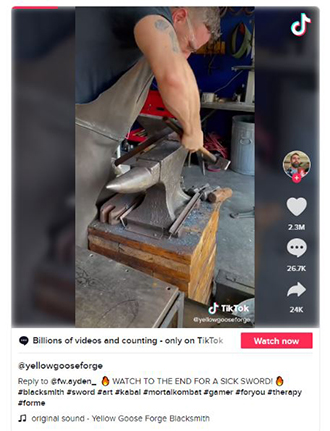Featured Topics
Featured Products
Events
S&P Global Offerings
Featured Topics
Featured Products
Events
S&P Global Offerings
Featured Topics
Featured Products
Events
S&P Global Offerings
Featured Topics
Featured Products
Events
Financial and Market intelligence
Fundamental & Alternative Datasets
Government & Defense
Professional Services
Banking & Capital Markets
Economy & Finance
Energy Transition & Sustainability
Technology & Innovation
Podcasts & Newsletters
Financial and Market intelligence
Fundamental & Alternative Datasets
Government & Defense
Professional Services
Banking & Capital Markets
Economy & Finance
Energy Transition & Sustainability
Technology & Innovation
Podcasts & Newsletters
2 Jun, 2021
By Anna Akins
The meteoric rise of short-form video platform TikTok Inc. is shaking up the social media business, with companies such as Facebook Inc. and Google LLC-owned YouTube LLC looking at expanding monetization opportunities for content creators.
While the idea of promoting content creators and their work has long been a focus for Facebook, Twitter Inc., Snap Inc. and YouTube, TikTok's efforts to broaden monetization opportunities for creators beyond advertising is catching on. TikTok content creators earn the bulk of their money from sponsored posts, product placements and selling merchandise on the site.
TikTok, like most internet platforms, generates the majority of its total revenues from advertising, but it also derives revenue from in-app purchases, where users buy virtual coins with real money to send virtual gifts to popular figures on the platform. The company, owned by Beijing Byte Dance Telecommunications Co. Ltd., has not disclosed detailed financial metrics.
 TikTok creators post everything from TikTok creators post everything from |
YouTube in May launched a $100 million fund for creators who use the company's short-form video feature Shorts, with executives calling the fund a first step to further monetize Shorts across its platform. That followed the November 2020 launch by Snap of a similar fund that now pays $1 million per day in aggregate to the creators of the top-performing videos on its short-form video service, Spotlight. Executives at Facebook and Twitter also recently noted their interest in paying creators for content through new features and tools.
Analysts say the growing competition for paid content from social media influencers and creators could ultimately help social companies diversify their business models and boost user engagement.
Seth Shafer, an analyst with Kagan, a media research group within S&P Global Market Intelligence, attributed TikTok's rapid rise among the creative community to its easy-to-use format for taking, editing and posting photos and videos, which then attracts more creators who post compelling content, enticing additional users to the site.
"It makes sense to see Facebook, Twitter and Snap lean more into that model — with the ultimate goal of increasing overall user engagement and time spent on their platforms — and extend the toolboxes they're offering to creators to also include new monetization possibilities such as fan subscriptions and tipping," Shafer said in emailed comments.
YouTube has plenty of dry powder to spend on its latest creator-focused efforts. For the just-ended quarter, the company's advertising revenue came to $6.01 billion. Parent Google generated advertising revenues of $44.68 billion in the same period.
Facebook CEO Mark Zuckerberg on an April earnings call said his company is mulling rolling out creator-focused subscription offerings and tipping features, along with mechanisms that enable creators to give product recommendations. Facebook will share more on these efforts later this year, Zuckerberg said.
"I think that a positive vision for the future of the economy is one where more people get to do creative work that they enjoy rather than jobs that they don't," Zuckerberg said in April. "And to get there, we need to build out the creative and monetization tools to support this creator economy."
It is not Facebook's first effort at rolling out new monetization tools. The company in 2017 launched its Facebook Creator App, which allows creators to film and post live videos and to connect with fans and other collaborators in a centralized messaging inbox.
Facebook reported $25.44 billion in ad revenues during in the just-ended quarter, comprising 97% of the company's consolidated revenue of $26.17 billion.
Twitter CFO Ned Segal at a recent industry event said the company is mulling a "Super Follows" feature where users would pay influential Twitter accounts for access to premium content, including short- and long-form videos, newsletters and publications. The company has long hinted at releasing a nonadvertising subscription-based service as well. Twitter's advertising revenues for the March quarter came to $899 million, comprising about 88% of the company's total quarterly revenues of $1.04 billion.
Jason Moser, lead adviser at financial advisory firm The Motley Fool, said social platforms' latest interest in promoting quick, catchy content plays well into users' generally short attention spans and is a trend that should continue for the foreseeable future.
"We all are guilty, I think, of, 'Give it to me as quickly as possible.' And certainly the short-form content scratches that itch," Moser said in an interview.